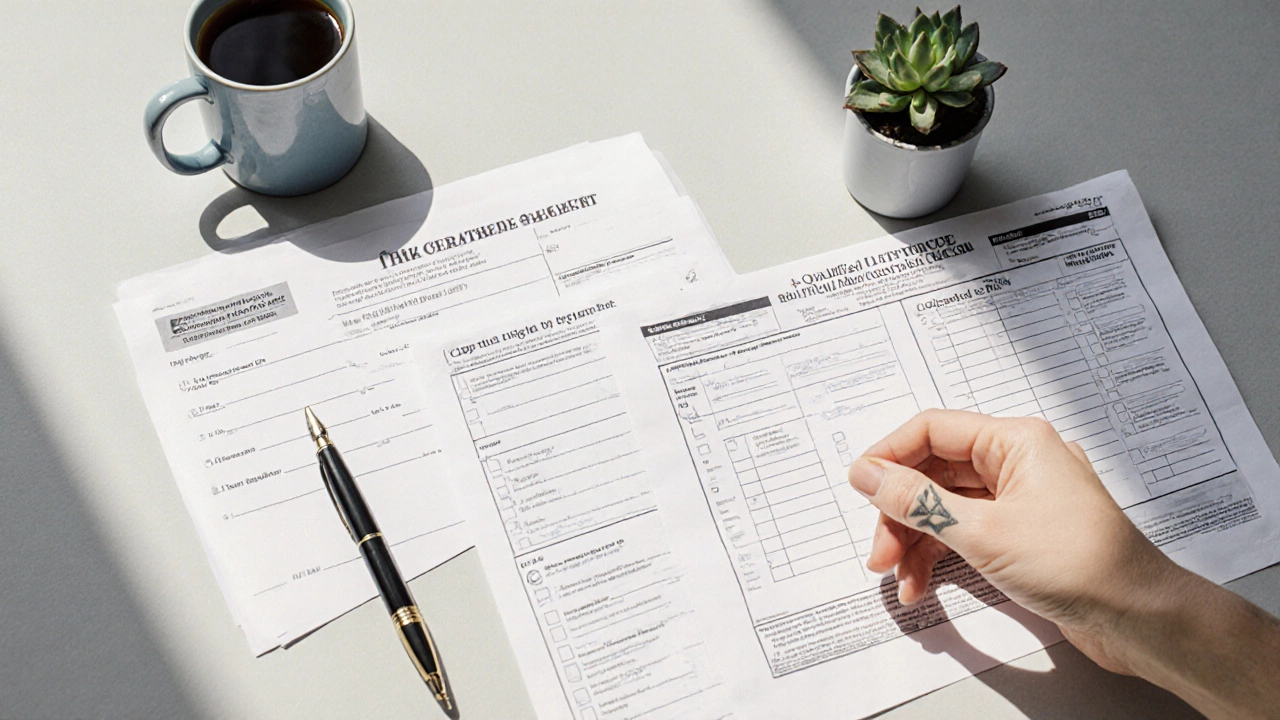Learn what non cash gifts to charity are, how to value them, tax paperwork required, and best practices for donors. Includes examples, a handy checklist, and FAQs.

- Created by: Lydia Carmichael
- Completed on: 19 Oct 2025
- Categories: Charities
Non-Cash Gift Tax Value Calculator
Estimate Your Donation Value
When you hear the term non cash gifts, you might picture a box of old clothes or a used sofa being handed over at a local shelter. But the world of in‑kind giving is far wider - and it can be just as rewarding, tax‑friendly, and impactful as writing a check. This guide walks you through everything you need to know: from what counts as a non‑cash gift, to how to value it, to the paperwork that keeps the IRS happy.
Key Takeaways
- Non‑cash gifts include physical items, securities, real estate, and even donated services.
- The fair market value (FMV) determines the deduction you can claim.
- Donations over $500 generally require IRS Form 8283; items over $5,000 need a qualified appraisal.
- Only contributions to qualified charitable organizations are deductible.
- A solid checklist helps you avoid common pitfalls and keep your records audit‑ready.
What Counts as a Non‑Cash Gift?
Non-cash gift is an item, property, or service donated to a charity instead of money. The IRS recognizes these as "in‑kind" contributions, and they can be just as valuable as cash. The key is that the donor must receive a charitable contribution receipt that documents the donation.
Common Types of Non‑Cash Gifts
Here are the most frequent categories you’ll encounter at fund‑raisers, thrift stores, and online donation portals:
- Clothing and household goods - everything from jackets to kitchenware.
- Furniture - sofas, dining tables, office desks.
- Vehicles - cars, motorcycles, boats.
- Securities - stocks, bonds, mutual fund shares.
- Real estate - residential or commercial property.
- Artwork and collectibles - paintings, sculptures, rare coins.
- Professional services - pro‑bono legal advice, consulting hours.

How to Value Your In‑Kind Donation
Unlike cash, the deduction hinges on the fair market value (FMV) of the item at the time of donation.
**Simple items (clothing, small household goods)** - Use the “sale price you could reasonably expect” method. Look at comparable listings on eBay or local classifieds. If the item would sell for $30, that’s your FMV.
**Higher‑value assets (vehicles, securities, real estate)** - Follow these steps:
- Obtain an independent appraisal from a qualified professional.
- Make sure the appraisal includes a description, condition, and the method used to determine FMV.
- Keep the appraisal attached to your tax records; the IRS can request it years later.
**Publicly traded securities** - Use the average of the high and low price on the donation date. Most brokerage statements already list this figure.
Tax Paperwork You Need
Paperwork varies by donation value:
| Item Type | Typical FMV | IRS Form Required | Appraisal Needed? |
|---|---|---|---|
| Clothing/Household goods | Under $500 | Receipt only | No |
| Furniture/Appliances | $500 - $5,000 | Form 8283, Part I | No (unless > $5,000) |
| Vehicles, Art, Antiques | Over $5,000 | Form 8283, Part II | Qualified appraisal required |
| Securities, Real Estate | Any value | Form 8283 + Schedule D | Appraisal required for > $5,000 |
The cornerstone document is IRS Form 8283. Charities must sign the form, confirming they received the property. Keep a copy for at least three years.

Best Practices & Common Pitfalls
Even seasoned donors stumble over a few avoidable mistakes. Here’s a quick rundown:
- Don’t overestimate FMV. The IRS can disallow a deduction if the value seems inflated.
- Verify the organization’s status. Only qualified charitable organization (501(c)(3) in the U.S.) makes your gift deductible.
- Keep every receipt. Even a handwritten note works if it shows the date, description, and donor’s name.
- Watch out for “use‑it‑or‑lose‑it” rules. Some charities require the donated goods to be used within a certain timeframe for the deduction to hold.
- Know the deduction limits. Generally, you can deduct up to 50% of your adjusted gross income (AGI) for most property, but the limit drops to 30% or 20% for certain assets like appreciated securities.
Donor Checklist: Stay Audit‑Ready
- Confirm the charity’s 501(c)(3) status.
- Document the item’s condition and description.
- Determine FMV using comparable sales or a qualified appraisal.
- Obtain a written receipt signed by the charity.
- Complete IRS Form 8283 if FMV exceeds $500.
- Attach any required appraisals (for items > $5,000).
- File the forms with your tax return and keep copies for three years.
Frequently Asked Questions
Can I deduct the time I volunteer for a charity?
No. The value of your labor isn’t deductible, but any out‑of‑pocket expenses you incur while volunteering (like materials or mileage) can be.
What if the charity sells my donated item for less than the FMV I claimed?
You keep the deduction based on the FMV at the time of donation. The charity’s resale price doesn’t affect your tax benefit.
Do I need a professional appraisal for a used car worth $4,800?
No. Since it’s under $5,000, a written receipt and a reasonable estimate of FMV are sufficient. Use a trusted pricing guide like Kelley Blue Book.
Are gifts of cryptocurrency considered non‑cash gifts?
Yes. The IRS treats cryptocurrency as property. You must report the FMV on the donation date and may need Form 8283 if the value exceeds $500.
What records should I keep if I donate stocks?
Keep the brokerage confirmation, the FMV calculation (average of high/low price that day), and the signed receipt from the charity. If the stock’s FMV is over $5,000, attach a qualified appraisal as well.